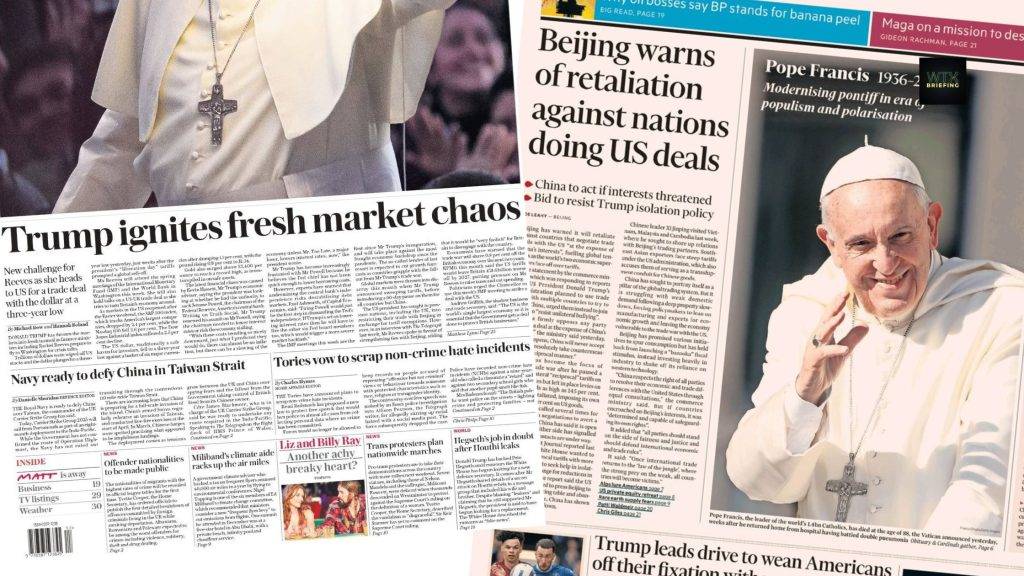As of 22 April 2025, U.S. stock markets remain volatile following the April 2nd crash, which wiped over $3 trillion in value after President Trump’s sweeping tariffs—up to 125% on Chinese imports—sparked global trade tensions.
The trade war with China continues to escalate, with the U.S. imposing steep port fees on Chinese-built vessels and restricting AI chip exports, prompting retaliatory tariffs from Beijing. China has also warned it will retaliate against countries that negotiate trade deals with the US “at the expense of China’s interests”, fuelling global tensions as the world’s two economic superpowers face off over tariffs.
These developments have contributed US dollar weakening with the Dollar Index hitting a three-year low amid investor concerns over Federal Reserve independence and economic outlook.
U.S stock markets volatile – trade war with China continues to escalate – US dollar weakening



Beijing warns of retaliation against nations doing US deals
Explainer: This headline uses confrontational and dramatic language to heighten tension and frame Beijing as aggressive. The word “warns” implies a threat, while “retaliation” suggests punitive action, both of which create a sense of conflict. By saying “nations doing US deals,” the phrasing subtly aligns the reader with the West and casts China in a hostile role. This tactic, common in geopolitical reporting, simplifies complex diplomacy into a binary narrative of allies versus adversaries, reinforcing a potentially Western-centric bias.
- The Financial Times reports on the global trade tumult: “Beijing warns of retaliation against nations doing US deals”. Beijing has warned it will retaliate against countries that negotiate trade deals with the US “at the expense of China’s interests”, fuelling global tensions as the world’s two economic superpowers face off over tariffs.
Stocks tumble and dollar hits three-year low as Trump bashes Powell again
Explainer: This headline uses sensational language, with words like “tumble” and “hits” to exaggerate the negative impact on the stock market and the dollar, making the situation appear more dramatic. The phrase “Trump bashes Powell again” focuses on personal conflict and blame, emphasising Trump’s criticism of Federal Reserve Chairman Jerome Powell, which can evoke a sense of instability. The choice of wording creates a more emotive and confrontational tone, rather than providing a balanced or analytical perspective, which leans towards sensationalism and a focus on the drama of the situation.
- CNN says US stocks ended the day sharply lower Monday and the dollar tumbled as investors assessed continued tariff uncertainty and the implications of President Donald Trump’s ongoing mission to try and oust Federal Reserve Chair Jerome Powell.
Fresh Trump markets turmoil as Reeves heads to Washington
Explainer: This headline uses the term “Fresh Trump markets turmoil” to emphasise the ongoing instability, suggesting a continual cycle of disruption linked to Trump’s actions. The word “turmoil” evokes a sense of chaos and unease, heightening the drama. Introducing “Reeves heads to Washington” adds an element of intrigue, implying a new development or a potential response to the turmoil. This phrasing combines sensationalism with a focus on political drama, aiming to capture attention by framing the situation as both unpredictable and consequential.
- Telegraph reports Donald Trump has thrown markets into fresh turmoil as finance ministers including Rachel Reeves prepare to fly to Washington for crisis talks. Trillions of dollars were wiped off US stocks and the dollar plunged to a three-year low on Monday just weeks after the President’s “liberation day” tariffs triggered a global sell-off.
US Dollar Hits Three-Year Low as Stocks Tumble Amid Trump Attacks on Fed
Explainer: This headline uses dramatic language like “hits three-year low” and “tumble” to exaggerate the severity of the situation, creating a sense of crisis around the US dollar and stock market. The phrase “Trump attacks on Fed” personalises the issue, focusing on Trump’s criticism of the Federal Reserve, which frames the market movements as a direct result of his actions. This tactic combines sensationalism with a focus on political conflict, emphasising instability and presenting the situation in a highly charged, confrontational light rather than offering a nuanced analysis.
- Newsweek says Wall Street tumbled and the dollar slumped to a three-year low on Monday as growing global skepticism over U.S. investments intensified, driven by President Donald Trump’s ongoing trade war and public criticism of the Federal Reserve.


